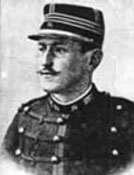Alfred Dreyfus & “The Affair”
 Alfred Dreyfus
Alfred Dreyfus |
The Dreyfus case underscored and intensified bitter divisions
within French politics and
society. The fact that it followed other scandals — the Boulanger
affair, the Wilson case, and the bribery of government officials and
journalists that was associated with the financing of the Panama Canal
— suggested that the young French Republic was in danger of collapse.
The controversy involved critical institutions and issues, including
monarchists and republicans, the political parties, the Catholic Church,
the army, and strong anti-Semitic sentiment.
Alfred Dreyfus, an obscure captain in the French army,
came from a Jewish family that had left its native Alsace for Paris when
Germany annexed that province in 1871. In 1894 papers discovered in a
wastebasket in the office of a German military attaché made it appear that
a French military officer was providing secret information to the German
government. Dreyfus came under suspicion, probably because he was a Jew and
also because he had access to the type of information that had been
supplied to the German agent. The army authorities declared that Dreyfus’
handwriting was similar to that on the papers. Despite his protestations of
innocence he was found guilty of treason in a secret military
court-martial, during which he was denied the right to examine the evidence
against him. The army stripped him of his rank in a humiliating ceremony
and shipped him off to [life imprisonment on] Devil’s Island, a penal
colony located off the coast of South America. The political right, whose
strength was steadily increasing, cited Dreyfus’ alleged espionage as
further evidence of the failures of the Republic. Édouard Drumont’s
right-wing newspaper La Libre Parole intensified its attacks on the Jews,
portraying this incident as further evidence of Jewish treachery.
Dreyfus seemed destined to die in disgrace. He had few
defenders, and anti-Semitism was
rampant in the French army. An unlikely defender came to his rescue,
motivated not by sympathy for Dreyfus but by the evidence that he had been
“railroaded” and that the officer who had actually committed espionage
remained in position to do further damage. Lieutenant Colonel Georges
Picquart, an unapologetic anti-Semite, was appointed chief of army
intelligence two years after Dreyfus was convicted. Picquart, after
examining the evidence and investigating the affair in greater detail,
concluded that the guilty officer was a Major named Walsin Esterhazy.
Picquart soon discovered, however, that the army was more concerned about
preserving its image than rectifying its error, and when he persisted in
attempting to reopen the case the army transferred him to Tunisia. A
military court then acquitted Esterhazy, ignoring the convincing evidence
of his guilt.
 |
“The Affair” might have ended then but for the
determined intervention of the novelist Émile Zola, who published his
denunciation (“J’accuse!”) of the army cover-up in a daily newspaper.
[Note: Zola was found guilty of libeling the army and was sentenced to
imprisonment. He fled to England, where he remained until being granted
amnesty.] At this point public passion became more aroused than ever, as
the political right and the leadership of the Catholic Church — both of
which were openly hostile to the Republic — declared the Dreyfus case to
be a conspiracy of Jews and Freemasons designed to damage the prestige of
the army and thereby destroy France.
Sometime later another military officer discovered
that additional documents had been added to the Dreyfus file. He determined
that a lieutenant colonel (Hubert Henry) had forged the documents —
which seemed to strengthen the case against Dreyfus — in anticipation
that Dreyfus would be given a new trial. Immediately after an interrogation
the lieutenant colonel committed suicide. In 1899 the army did in fact
conduct a new court-martial which again found Dreyfus guilty and condenmed
him to 10 years detention, although it observed that there were “extenuating
circumstances.”
In September 1899, the president of France pardoned Dreyfus, thereby making it possible for him to return
to Paris, but he had to wait until 1906 — twelve years after the
case had begun — to be exonerated of the charges, after which he
was restored to his former military rank.
“The Affair” had inspired moderate republicans,
Radicals, and socialists to work together, and the ultimate exoneration of
Dreyfus strengthened the Republic, in no small part because of the conduct
of its enemies, most notably the army and the Catholic hierarchy. In 1905
the Radical party, emphasizing the role of the Catholic leadership in the
Dreyfus case, succeeded in passing legislation separating church and state.
Sources: The Affair - The Case of Alfred Dreyfus. Homepage of
Michael Sinclair
|